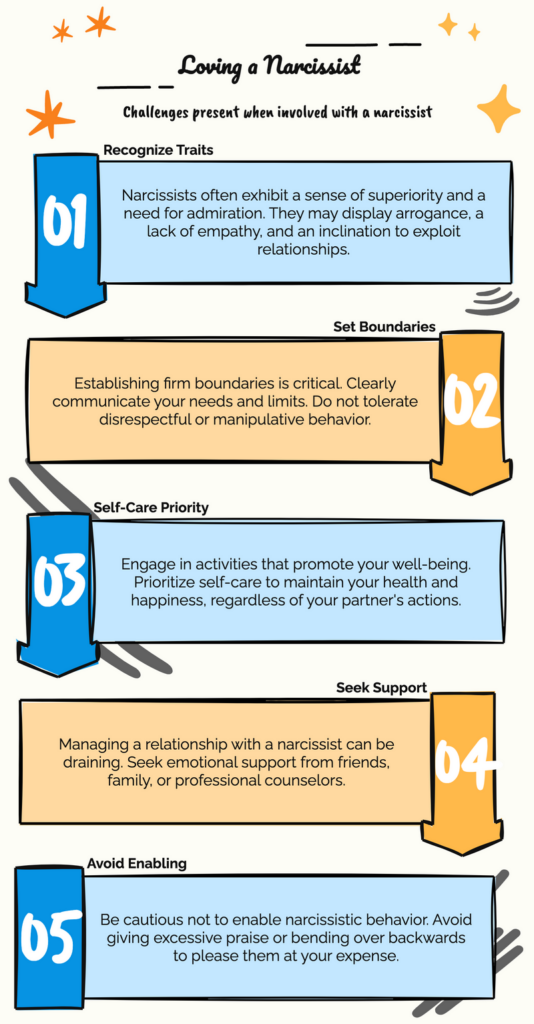Were you aware that around 6.2% of individuals suffer from a type of narcissistic personality disorder?
Loving a narcissist can be a complex and challenging experience. It requires navigating their self-centeredness, lack of empathy, and constant need for admiration. However, with the right strategies and mindset, it is possible to maintain a healthy relationship with a narcissistic partner.
In this article, we will explore the dynamics of loving a narcissist and provide practical tips on how to cope with the unique challenges that arise in such relationships. Whether you’re currently in a relationship with a narcissist or simply want to understand this personality disorder better, this article will offer valuable insights and guidance.
Key Takeaways:
- Understanding the traits and characteristics of narcissistic personality disorder is essential in managing and loving a narcissist.
- Recognizing the signs of being in love with a narcissist can help you assess the health of your relationship.
- Implementing strategies such as setting boundaries, practicing self-care, and seeking support can contribute to maintaining a healthier dynamic.
- Educating yourself about narcissistic personality disorder and developing realistic expectations are crucial in navigating a relationship with a narcissist.
- Leaving a narcissistic relationship can be challenging but necessary for your own well-being. Having a support system and seeking therapy can aid in the healing process.
Understanding Narcissistic Personality Disorder
Narcissistic Personality Disorder (NPD) is a mental health condition characterized by a grandiose sense of self-importance, a need for excessive admiration, and a lack of empathy. People with NPD may have difficulty maintaining stable self-esteem and often prioritize their own needs over others.

Narcissistic traits and characteristics of NPD can manifest in various ways. Individuals with NPD may exhibit a constant need for validation and admiration, an exaggerated sense of entitlement, and a tendency to exploit others for personal gain. They may lack empathy and struggle to understand or consider the feelings and perspectives of others.
It is important to recognize that NPD is a complex condition that requires professional diagnosis. While individuals may display narcissistic traits, it does not necessarily mean they have NPD. A comprehensive assessment by a qualified mental health professional is crucial to determine the presence of Narcissistic Personality Disorder.
“Narcissistic Personality Disorder (NPD) is a mental health condition characterized by a grandiose sense of self-importance, a need for excessive admiration, and a lack of empathy.”
The Narcissistic Personality Disorder Diagnostic Criteria according to the DSM-5
| Criteria | Description |
|---|---|
| Grandiose sense of self-importance | Having an inflated sense of self-worth and believing they are special or unique |
| Preoccupation with fantasies of unlimited success, power, brilliance, beauty, or ideal love | Fantasizing or daydreaming about achieving great success, power, or perfect relationships |
| Belief in their own uniqueness and superiority | Feeling special, superior, and above average compared to others |
| Need for excessive admiration | Having a constant craving for attention, praise, and admiration from others |
| Sense of entitlement | Expecting special treatment and feeling deserving of privileges |
| Lack of empathy | Being unable or unwilling to understand and recognize the needs and feelings of others |
| Exploitative behavior | Using others for personal gain without consideration for their well-being |
| Envious of others or believes others are envious of them | Feeling resentful or jealous of others’ achievements or believing others envy them |
| Arrogant or haughty behaviors | Displaying an attitude of superiority and behaving condescendingly towards others |
It’s important to remember that understanding NPD is crucial for personal awareness and to seek appropriate support and assistance in dealing with individuals with Narcissistic Personality Disorder. Seeking professional help, such as therapy or counseling, can provide valuable guidance in navigating relationships with individuals who exhibit narcissistic traits.
Signs You Are in Love with a Narcissist
When it comes to love, it’s not always easy to identify whether you’re involved with a narcissist. Understanding the signs can help you navigate the complexities of loving a narcissistic partner. Here are some key traits to look out for:
- Charm Offensive: Narcissists are known for their initial charm and charisma, often going above and beyond to win you over. Their charm offensive may make it difficult to see their true nature.
- Self-Centeredness: A narcissistic partner is excessively focused on themselves, often prioritizing their own needs and desires above yours. They may display a lack of interest or empathy for your feelings or struggles.
- Lack of Empathy: Empathy is an essential trait in a healthy relationship. However, a narcissist often lacks the ability to understand or connect with others’ emotions, making it challenging to build emotional intimacy.
- Constant Need for Attention and Admiration: Narcissists have an insatiable hunger for attention and admiration, constantly seeking validation and praise from others. They may go to extreme lengths to ensure they are the center of attention.
- Feeling Unheard: In a relationship with a narcissist, your opinions, needs, and feelings may be regularly dismissed or overridden. Your voice may feel unheard, and your emotional well-being can become neglected.
- Manipulation and Putting Others Down: Narcissists frequently manipulate others to maintain control and power. They may belittle you, criticize your achievements, and undermine your self-esteem to assert dominance.

Identifying these signs is the first step to understanding whether you are truly in love with a narcissist. It’s essential to recognize the impact of these behaviors on your well-being and make informed decisions about your relationship.
How to Make a Relationship with a Narcissist Work
Creating a functional relationship with a narcissist requires patience, effort, and understanding. While it can be challenging, it’s not impossible to find common ground and foster a healthy dynamic. Here are some steps you can take to make a relationship with a narcissist work:
- Set clear boundaries: Establishing clear boundaries is crucial when dealing with a narcissistic partner. Clearly communicate your limits and expectations, and consistently reinforce them. This helps prevent your partner from overstepping and maintains a healthy balance in the relationship.
- Communicate openly: It’s important to express how your partner’s actions affect you. Clearly communicate your feelings and needs in a calm and assertive manner. This allows for open dialogue and the opportunity to address issues in the relationship.
- Avoid idealization: While it’s natural to idolize and admire your partner, it’s essential to remain realistic. Recognize that your partner has flaws and is not perfect. This prevents you from setting unrealistic expectations and potential disappointment.
- Educate yourself: Understanding narcissistic personality disorder (NPD) is key to managing the relationship. Learn about the traits and behaviors associated with NPD to gain insight into your partner’s perspective and challenges. This knowledge can help you navigate difficult situations and maintain empathy.
- Develop realistic expectations: It’s vital to have realistic expectations for the relationship. Accept that your partner may not change their narcissistic tendencies completely. Focus on finding a balance that works for both of you and prioritize your own well-being.
By implementing these strategies, you can increase the chances of making a relationship with a narcissist work. Remember, however, that it’s essential to prioritize your own well-being and seek support when needed.

Coping Strategies for Loving a Narcissist
Coping with a narcissist can be mentally and emotionally challenging, but there are strategies you can employ to navigate this difficult relationship. By managing your own emotions and practicing self-care, you can protect your well-being while still being involved with a narcissistic partner.
Establish a Support Network Outside the Relationship
It’s crucial to have a strong support network of friends and family who can provide emotional support and guidance outside the relationship. Surround yourself with people who understand the complexities of loving a narcissist and who can offer a listening ear or a fresh perspective when needed.
Consider Seeking Therapy for Yourself
Therapy can be immensely helpful for individuals coping with a narcissistic relationship. A qualified therapist can provide insights, coping strategies, and a safe space to process your emotions. They can help you develop healthy coping mechanisms, build resilience, and gain clarity about your own needs and boundaries.
Develop Thick Skin and Do Not Internalize Hurtful Comments
One of the challenges of being in a relationship with a narcissist is dealing with their hurtful comments and criticisms. It’s important to remember that narcissists often use manipulative tactics to maintain control and boost their own self-esteem. Developing thick skin and not internalizing their hurtful words can help protect your self-esteem. Remind yourself that their comments reflect their own insecurities and should not define your worth.
“No amount of external validation or love can fill the void within a narcissist. Their toxic behavior is a reflection of their own internal struggles.” – Unknown
Set Boundaries and Communicate Assertively
Setting boundaries is crucial when dealing with a narcissistic partner. Clearly communicate your needs, expectations, and limits. Be assertive in expressing your emotions and assert your right to be treated with respect. However, be prepared for pushback as narcissists often resist and challenge boundaries. Stay firm in enforcing your boundaries and be willing to walk away if they are consistently disrespected.
Practice Self-Care
Self-care is essential for your overall well-being in a narcissistic relationship. Engage in activities that bring you joy, prioritize your physical and mental health, and set aside time for self-reflection and relaxation. Practice self-compassion and remind yourself that you deserve love, respect, and happiness.

Understanding the Psychology of a Narcissist
The psychology of a narcissist revolves around their fragile self-esteem and insatiable need for constant admiration. They possess an overwhelming desire to be praised and recognized, often seeking validation from others to maintain their inflated sense of self-worth. However, beneath their façade of confidence lies a deep-rooted insecurity that drives their narcissistic behaviors.
Narcissists struggle to recognize and empathize with the feelings of others. Their lack of empathy makes it challenging for them to form genuine connections and maintain healthy relationships. They prioritize their own needs, disregarding the impact of their actions on those around them. This self-centered outlook often leads to strained interpersonal dynamics and emotional turmoil for their partners and loved ones.
It’s crucial to understand that the behavior exhibited by narcissists stems from their mental health condition and is not a conscious choice. While they may appear arrogant and insensitive, their actions are rooted in their subconscious need for self-preservation and protection of their fragile ego.

Narcissistic Personality Traits:
| Traits | Description |
|---|---|
| Grandiose sense of self-importance | Narcissists have an exaggerated belief in their own superiority and importance. |
| Need for excessive admiration | They constantly seek validation and praise from others, using it to boost their sense of self-worth. |
| Lack of empathy | Narcissists struggle to understand and relate to the emotions of others, often unable to recognize or validate their experiences. |
| Sense of entitlement | They believe they deserve special treatment and attention, disregarding the needs and feelings of those around them. |
| Exploitative behavior | Narcissists often manipulate and use others to meet their own needs, without concern for the well-being of others. |
| Envy and jealousy | They harbor resentment and envy towards others’ achievements, feeling threatened by anyone who may challenge their superiority. |
Understanding the psychology of a narcissist can help partners, friends, and family members navigate their challenging behaviors with empathy and compassion. Recognizing the underlying motivations behind their actions can foster understanding and enable healthier interpersonal dynamics.
Maintaining a Healthy Relationship with a Narcissist
In the challenging endeavor of maintaining a healthy relationship with a narcissist, it is crucial to prioritize your own well-being. This involves setting healthy boundaries and evaluating their behavior, while being honest with both yourself and the narcissist. By practicing mindfulness and seeking help when needed, you can contribute to a healthier dynamic in the relationship.
It is essential to remember that you deserve to be treated with respect and should not tolerate any form of abuse. By establishing and enforcing boundaries, you can protect yourself from potential harm and create a more balanced relationship. This can include setting limits on unacceptable behavior, clearly communicating your needs and expectations, and being prepared to walk away if those boundaries are not respected.
Seeking professional assistance, such as therapy, can provide invaluable support. A therapist can help you navigate the complexities of the relationship, offer guidance on setting and maintaining boundaries, and assist you in developing coping strategies. They can also provide a safe space for you to express your feelings and concerns, as well as help you explore whether maintaining the relationship is ultimately beneficial for your well-being.

Remember, maintaining a healthy relationship with a narcissist requires a balance between self-care and empathy. It is important to take care of your own emotional needs, seek support from friends and family, and engage in activities that bring you joy and fulfillment. By prioritizing your well-being and committed to maintaining healthy boundaries, you can navigate a relationship with a narcissist while safeguarding your mental and emotional health.
| Key strategies for maintaining a healthy relationship with a narcissist |
|---|
| 1. Set clear boundaries and enforce them consistently |
| 2. Communicate your needs and expectations openly |
| 3. Seek professional help, such as therapy |
| 4. Practice self-care and prioritize your own well-being |
Dealing with Manipulation in a Relationship with a Narcissist
Narcissists often employ manipulation tactics in their relationships, exploiting the vulnerabilities of their partners for their own gain. To navigate this challenging aspect of a relationship with a narcissist, it is crucial to recognize and address their manipulative behaviors head-on, while also establishing clear boundaries to protect yourself.
Educating yourself about common manipulation tactics can provide you with valuable insights into the methods narcissists use. This knowledge empowers you to identify and confront manipulation effectively. By understanding these tactics, such as gaslighting, guilt-tripping, and love bombing, you can develop strategies to counteract their effects.
Seeking support from a therapist or counselor can be immensely beneficial when dealing with narcissistic manipulation. They can offer professional guidance, helping you gain clarity and build resilience against manipulation. They can also provide tools and techniques to enhance your communication skills and boost your self-confidence, enabling you to establish and maintain healthy boundaries within the relationship.
“Recognizing narcissistic manipulation and proactively setting boundaries are crucial steps in maintaining your emotional well-being and protecting yourself from harm.” – Dr. Sarah Adams, Relationship Therapist
Remember, your well-being should always be your top priority. Pay attention to your own needs and emotions, and don’t hesitate to prioritize self-care. Surround yourself with a strong support network of friends and family who can provide guidance and understanding. Engaging in activities that bring you joy, practicing mindfulness, and implementing self-care routines can help you maintain your emotional balance in the face of manipulation.
Dealing with manipulation in a relationship with a narcissist is never easy, but by recognizing their tactics, setting clear boundaries, and seeking support, you can regain control over your life and protect your well-being.
| Effective Strategies for Handling Narcissistic Manipulation | Results |
|---|---|
| Recognize manipulation tactics | Empowers you to confront manipulative behaviors |
| Establish clear boundaries | Protects your emotional well-being |
| Obtain support from a therapist | Gains professional guidance and tools to counteract manipulation |
| Practice self-care | Preserves your emotional balance and well-being |
The Importance of Self-Care in a Relationship with a Narcissist
When you find yourself in a relationship with a narcissist, practicing self-care becomes essential for your emotional well-being. Loving a narcissist can be emotionally exhausting, and taking care of yourself is crucial to maintain your own mental health.
Here are some important self-care practices to prioritize while loving a narcissist:
- Take breaks: It’s important to step away from the relationship at times to recharge and gain clarity. Set aside time for yourself, engage in activities that bring you joy, and focus on your own needs.
- Manage your emotions: Dealing with a narcissist’s behavior can be highly triggering. Practice emotional regulation techniques such as deep breathing, journaling, or seeking the support of a therapist to help navigate the emotional rollercoaster. Remember that your feelings are valid.
- Prioritize your well-being: Make self-care a priority in your life. Engage in activities that nourish your soul, such as practicing hobbies, exercising, or practicing mindfulness. Taking care of your physical and mental health is crucial in a narcissistic relationship.
- Seek support: Reach out to friends, family, or trusted individuals who can provide a listening ear and emotional support. Surrounding yourself with a strong support network can help you navigate the challenges of loving a narcissist.
- Practice self-compassion: Be kind to yourself and acknowledge that you are doing the best you can in a difficult situation. It’s important to remember that you deserve love, respect, and understanding.
Remember, practicing self-care is not selfish; it is necessary to preserve your own well-being while navigating a narcissistic relationship.
“Self-care is not a luxury; it is a necessity. Prioritizing your own well-being allows you to better navigate the challenges of loving a narcissist.”
Setting Boundaries with a Narcissistic Partner
When in a relationship with a narcissist, setting boundaries is crucial for maintaining your emotional well-being. It is important to establish clear expectations and communicate your needs effectively. Here are some strategies to set healthy boundaries:
- Clearly communicate: Express your needs and expectations to your partner in a calm and assertive manner. Use “I” statements to avoid sounding accusatory. Let them know how their behavior affects you and what you require for a healthy relationship.
- Be prepared for pushback: Narcissists may resist or challenge your boundaries. They may try to manipulate or guilt-trip you into abandoning them. Stay firm and remind yourself that your boundaries are essential for your well-being.
- Enforce boundaries: Consistently reinforce the boundaries you have set. Do not waver or compromise on what you need. By consistently enforcing your boundaries, you send a clear message that you expect them to be respected.
- Be willing to walk away: If your boundaries are repeatedly ignored or disrespected, be prepared to make tough decisions. Prioritize your own well-being and consider leaving the relationship if necessary.
Remember that setting boundaries is not selfish; it is an act of self-care and self-respect. Protecting yourself from narcissistic abuse is essential for your mental and emotional health.
“Setting boundaries is about having the courage to love ourselves even when we risk disappointing others.” – Brené Brown
| Benefits of Setting Boundaries | Consequences of Not Setting Boundaries |
|---|---|
|
|
The Challenges of Leaving a Narcissistic Relationship
Leaving a narcissistic relationship can be an incredibly daunting and difficult process. Narcissists often employ manipulation tactics to control and coerce their partners into staying, making it even more challenging to break free. However, it’s essential to prioritize your well-being and regain control of your life. Here are some of the challenges you may encounter when ending a relationship with a narcissist:
- Manipulation and Control: Narcissists are experts at manipulating their partners, using emotional manipulation, guilt-tripping, and gaslighting techniques to undermine their confidence and make them doubt their decision to leave.
- Emotional Rollercoaster: Breaking free from a narcissistic relationship is often an emotional rollercoaster. You may experience a range of emotions, including fear, guilt, sadness, and relief. It’s important to acknowledge and process these emotions in a healthy way.
- Isolation: Narcissists often isolate their partners from friends and family as a means of control. As a result, you may feel isolated and lack a support system when trying to leave the relationship. Building a support network of trusted friends, family, or support groups can be instrumental in providing emotional support during this challenging time.
- Financial Dependence: Many individuals in narcissistic relationships find themselves financially dependent on their narcissistic partner. This financial entanglement can make it even more challenging to leave, as it may seem like an insurmountable obstacle. Seeking professional advice, creating a financial plan, and exploring resources available in your community can help you navigate this challenge.
To overcome these challenges and successfully leave a narcissistic relationship, it’s crucial to take proactive steps:
- Stay Strong: Remind yourself of your worth and inner strength. Believe in your ability to create a better future for yourself free from the narcissistic abuse.
- Prepare Ahead of Time: Before initiating the break-up, plan for your safety and well-being. Ensure you have a safe place to go, gather important documents, and consider changing passwords or securing your personal information.
- Establish a Support System: Surround yourself with trusted friends, family members, or support groups who understand the dynamics of narcissistic relationships. Lean on them for emotional support and guidance throughout the process.
Ending a relationship with a narcissist is not an easy task, but it is a necessary step towards reclaiming your happiness and well-being. Remember that you deserve to be treated with respect and love. Seek professional help, such as therapy, to heal from the emotional scars and regain your sense of self. You are not alone in this journey.
| Organization | Contact Information |
|---|---|
| National Domestic Violence Hotline | Call: 1-800-799-7233 | Website: The National Domestic Violence Hotline |
| Loveisrespect | Call: 1-866-331-9474 | Text: LOVEIS to 22522 | Website: Loveisrespect |
| Narcotics Anonymous | Website: Narcotics Anonymous |
Conclusion
In conclusion, coping with and loving a narcissist can be a challenging journey. However, it is not impossible to navigate this complex dynamic. Understanding the complexities of narcissistic personality disorder is crucial in order to effectively respond to the behaviors and traits of a narcissistic partner.
Setting boundaries is essential when dealing with a narcissist. Clearly communicate your needs and expectations, and be firm in enforcing these boundaries. Prioritizing self-care is also vital. Take time for yourself, engage in activities that bring you joy, and seek support from friends and family.
Educating yourself about narcissism and seeking therapy can provide valuable support throughout your journey. Remember, you deserve to be treated with respect and not tolerate any form of abuse. By prioritizing your own well-being, you can find the strength to navigate and cope with a narcissistic relationship.
FAQ
How can I love a narcissist?
Loving a narcissist can be challenging, but it is essential to prioritize self-care, set boundaries, and seek support. It’s important to assess if the relationship is healthy for you and reinforce positive behavior.
What is Narcissistic Personality Disorder (NPD)?
Narcissistic Personality Disorder (NPD) is a mental health condition characterized by a grandiose sense of self-importance, a need for excessive admiration, and a lack of empathy. It is a complex condition that requires professional diagnosis.
How do I know if I’m in love with a narcissist?
Signs of being in love with a narcissist include their initial charm, self-centeredness, lack of empathy, constant need for attention, and admiration. Feeling unheard, manipulated, and being constantly put down are also common signs.
How can I make a relationship with a narcissist work?
Making a relationship with a narcissist work requires setting clear boundaries, communicating how their actions affect you, and not idealizing your partner. Educating yourself about narcissistic personality disorder and having realistic expectations are also important.
What are some coping strategies for loving a narcissist?
Coping with a narcissist involves managing your own emotions, practicing self-care, and establishing a support network outside the relationship. Setting boundaries, communicating assertively, and not internalizing hurtful comments are also crucial.
What is the psychology of a narcissist?
The psychology of a narcissist involves a fragile self-esteem, a need for constant admiration, and difficulty recognizing other people’s feelings. It’s important to understand that their behavior stems from their mental health condition and not from personal choice.
How can I maintain a healthy relationship with a narcissist?
Maintaining a healthy relationship with a narcissist requires putting yourself first, evaluating their behavior, and being honest with them and yourself. Practicing mindfulness, seeking help, and prioritizing your own well-being also contribute to a healthier dynamic.
How can I deal with manipulation in a relationship with a narcissist?
Recognizing and calling out manipulative behaviors, setting clear boundaries, and educating yourself about manipulation tactics can help navigate this challenging aspect of a relationship with a narcissist. Seeking support from a therapist is also valuable.
Why is self-care important in a relationship with a narcissist?
Self-care is crucial when loving a narcissist. Taking breaks, managing emotions, engaging in joyful activities, seeking support from friends and family, and practicing self-compassion can help prevent emotional exhaustion.
How do I set boundaries with a narcissistic partner?
Setting clear boundaries involves clearly communicating your needs and expectations and being prepared for pushback. Staying firm in enforcing your boundaries and being willing to walk away if they are not respected is important for self-protection.
What are the challenges of leaving a narcissistic relationship?
Leaving a narcissistic relationship can be challenging, as narcissists may try to manipulate and control you to prevent you from leaving. It’s important to stay strong, have a support system in place, cut off communication, and seek therapy for healing.
How can I cope with and love a narcissist?
Coping with and loving a narcissist is challenging but not impossible. It requires understanding narcissistic personality disorder, setting boundaries, prioritizing self-care, educating yourself, seeking therapy, and not tolerating abuse.









